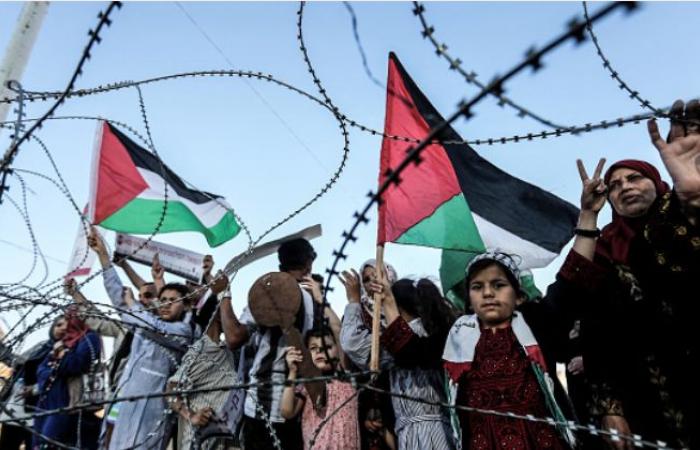Embed from Getty Images
Oct. 7, 2023, became one of those days — like the Kennedy assassination or 9/11 — that many of us will never forget. We know where we were and what we were doing when we heard the news. On that Saturday morning, I was heading to the local weekly organic market in Bethlehem when I heard that Hamas had broken through the barrier around Gaza and entered Israel. I quickly drove home, turned on Al Jazeera, and started hearing the details of what was happening. I called my cousin in Gaza, where all my mother’s family lived, and begged him to find a way out. I knew this was going to be a disaster, but by then it was too late. The family was stuck.
On that day and in the days that followed, instead of reflecting, analyzing and deeply questioning why all of this happened, the Israeli government — already labeled as fascist by many of its own citizens — immediately reinforced what had not worked for decades: more domination, more military power, more destruction toward the Palestinians and raising more fear within its population. Without time to grieve the Israelis who were killed or attempt to negotiate the release of hostages, Israel’s leadership escalated, demonizing the entire Palestinian population in Gaza, calling them “human animals,” and even comparing the attacks to the Holocaust. They invoked the Amalek, a reference from the Bible to the story of King Saul being ordered to annihilate every human and animal of the Amalek tribe.
The attacks on Gaza were fueled by revenge — a revenge motivated by Israel’s own sense of humiliation. Israel’s foundational ideology, to be a guaranteed secure homeland for the Jewish people who had faced centuries of persecution, collapsed within hours. Israel’s belief that building the strongest and most technologically advanced army in the region and controlling “the other” as the way to guarantee security proved to be a facade.
Sign Up for our Newsletter
We’ll send you a weekly email with the latest articles.
Yes, you might say — what about the past? Wasn’t there a peace process that also failed and there was no choice? When we look back at the peace process that began in the 1990s and continued to fail, we see that Israel was not truly negotiating for peace, but again negotiating for security and domination, from a place of domination. Everything “given” to the Palestinians in those negotiations — even the creation of the Palestinian Authority — was meant to maintain Israel’s superiority in the name of ostensibly meeting its security needs. Land confiscation of Palestinian lands to build illegal settlements continued and restrictions on Palestinian movement became more severe, not to forget the separation wall that they claimed to build for security reasons, but it became a permanent structure of division and control. Questions of liberation, freedom, equal rights, justice and mutual trust were reduced to symbolic gestures. Real peace was never the goal.
I speak not from a place of judgment, but from a desire to understand what happened so we can move forward. I speak as an activist who has dedicated his life to seeking justice and peace for all people in this land. I speak from a place of pain, seeing how we all failed to achieve these goals, allowing events like Oct. 7 to happen, and witnessing the ongoing death and destruction in Gaza and the West Bank. I speak as someone who has visited the death camps of Auschwitz and Birkenau, who has deeply learned and acknowledged the genocide that took place in Europe and how it created a collective consciousness of fear and trauma among Jews, built on previous centuries of marginalization and discrimination.
As a nonviolent activist, I have long understood that in a system of absolute domination, the response to any resistance — especially nonviolence — is suppression. This is what we have experienced through the many years of our engagement in nonviolent actions. We were all witness to the 2018 March of Return in Gaza where hundreds of Palestinians were killed and thousands injured in a nonviolent action demanding the right of refugees to return to their homes as charted by the United Nations. Nonviolence exposes systems of oppression and is therefore dangerous to such systems. I can’t count the number of times when Israelis or internationals came to me asking why don’t Palestinians use nonviolence? I would always ask them to define what they mean by nonviolence before I give them my answer. And yes, the difference was stark.
If we don’t address the collective trauma of both the oppressor and the oppressed, we will never achieve peace.
While the situation in Gaza is now one of surviving in the midst of ongoing bombing and attacks, the situation for nonviolent resistance in the West Bank in particular has become more dangerous and deadly than ever before. Driven by revenge, retaliation, dehumanization and domination, the Israeli military has doubled down on suppressing nonviolent resistance. Many Palestinian nonviolent activists in the West Bank were arrested early on in October and November 2023, including Ahed Tamimi and her father Basem, a leader of the nonviolence movement in Palestine, who was released in June 2024 after being tortured. Any nonviolent action is met with unprecedented violence from the Israeli army or settlers, who have been given more weapons and greater freedom to engage in violence against Palestinians. International solidarity activists have also been targeted, with Turkish-American activist Aysenur Ezgi Eygi shot in the head by an Israeli sniper last month.
For the past year, I’ve often felt hopeless, repeatedly asking, “What can we do?” This question runs through my head and through conversations with other Palestinian and Israeli activists. Even internationally, despite global protests, sit-ins and demonstrations calling for (at least) a ceasefire to stop the killing of innocent Palestinians — world leaders, especially in the West, only responded with statements that “Israel has the right to defend itself.” By that they mean that Israel is justified to always use violence, and they support it and thus will not change policy. Many global nonviolent protests were dismissed as anti-Israel or antisemitic, even met with violence by their own police forces.
Feeling hopeless is something, but giving up is not an option. Our commitment to nonviolence must be stronger than ever. We are not going to build a better future by killing or dominating each other and nonviolent resistance is the way to move forward. This became clearer to me recently when I was asked to give a training in nonviolent resistance to a group of 25 young Palestinian leaders, men and women in their early 20s. Seeing their openness to the potential of nonviolence rejuvenated a sense of hope in me that I hadn’t felt in a while.
When absolute power is combined with absolute fear, the result is absolute disaster.
Nonviolence can no longer be a reactionary response to aggression, as it often was in the past — protesting a land confiscation, a section of the separation wall being built, or a house demolition. It must become a clear, proactive movement with a vision and a comprehensive strategy that addresses the present and future obstacles to achieving freedom, justice, peace and equality in this land. It must address the systems of domination and power, not just their actions. Nonviolence must not be seen as the choice of those too weak to use armed resistance, but as the choice of those who are strong, committed and willing to risk what is needed for liberation and freedom.
Even if protests and demonstrations are impossible at this time, the tactics of nonviolence are plentiful. The basic strategies of non-cooperation and non-compliance must become a central part of resistance and resilience — not only for Palestinians but also for Israelis and the international community.
Specifically, a nonviolent movement must emerge on the Israeli side that directly challenges ideologies promoting fear, victimization, exclusivity, superiority and the dehumanization of the other. We must come together to address fear and trauma by creating spaces of mutual trust and respect, not separation, domination and militarization. If we don’t address the collective trauma of both the oppressor and the oppressed, we will never achieve peace. Those who negotiate from a place of fear (whether real or imagined) will always seek power over the other. When absolute power is combined with absolute fear, the result is absolute disaster, where we are today.
This disaster we are in affects not only the Palestinian population, which is suffering the most, but also the Israeli population, which will pay a heavy price in the long term if this system of power and fear — also known as fascism — continues to dominate. Internationally, the boycott and divestment movement must grow, and campaigns for sanctions against systems of fascism must become core values. Political candidates who expose fascism must be supported. This is not a Muslim vs. Judeo-Christian issue, an East vs. West issue, or a brown vs. white issue — as some Western politicians claim to incite fear in their populations. This is an issue of human rights, dignity and justice.
Support Us
Waging Nonviolence depends on reader support. Make a donation today!
Donate
For all of this, we need leadership — especially among Palestinians — that can bring unity and vision to a population divided by both Israel’s system of control and internal conflicts. While we need international and Israeli solidarity, this is the Palestinian struggle for liberation, and we must take the lead. Unity must include all Palestinians — those in the occupied territories, those in Israel (1948 Palestinians) and those in the diaspora. The current Palestinian political structure has failed us, and it needs to step down. As I watched the excitement of these young leaders during the training, my hope was that the older generation of leaders would begin to see and trust them, allowing them and others like them to emerge as the future leaders of the Palestinian people.
Nonviolence requires a high level of commitment and discipline and must be engaged in as a long term strategy, with an understanding that many battles will be won and many lost. It must not only be used to expose the occupation but to also build societies that adhere to the values of nonviolent living. And it must also engage the international community to put the necessary pressure on all parties to allow for a new peace process, one not motivated by domination and fear, but one that aims for collective liberation, peace, justice and security for all. At the end of the day my biggest hope is believing what Martin Luther King Jr. once said, “The arc of the moral universe is long, but it bends towards justice.”






